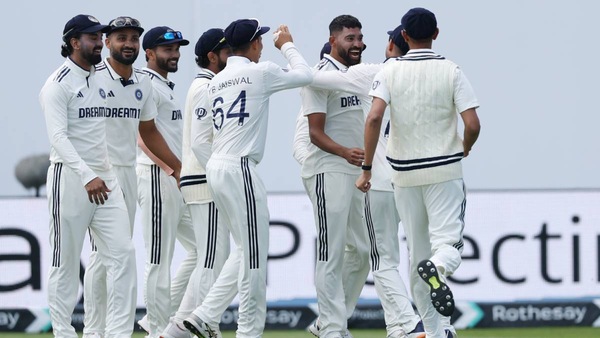IND vs ENG, 2nd Test Match, Day 3: Siraj Strikes, But Brook-Smith Hit Back
India’s pace unit silences critics early on Day 3, but England’s counterpunching pair turn the tide, writes Karan Pradhan.

Last Updated: 07.08 PM, Jul 04, 2025
Published during the lunch break in the UK, #MidMatchMemo delivers sharp analysis from the first session of play — and picks up where we left off the previous day.
***
WHAT A DIFFERENCE 50 hours make! Two days and a session ago, the obituaries of Indian fast bowling were already being written in the knee-jerk world of cricket punditry (both the mainstream and social media sort). With Jasprit Bumrah sitting out the second Test and Washington Sundar being preferred to Kuldeep Yadav, doubts were raised (including in this very column) about the efficacy of India’s current bowling attack.
Within the first 10 balls of the third day’s play, however, England’s skipper and former skipper were back in the pavilion and the team was teetering on the brink at 84/5. One of the architects of the hosts’ downfall was Mohammed Siraj. It may be recalled that the right-arm quick had come in for a fair bit of stick after his performance in the first Test. He most notably drew flak from former Indian cricketer Mohammad Kaif who exhorted Siraj not to bowl with his heart, but with his mind. The advice may have helped, because the very same Siraj seemed a completely changed bowler when he shared the new ball with Akash Deep.
On Thursday evening, he became the first bowler in the match to extract swing from the conditions, and on Friday morning, he snapped up Joe Root down the leg side and dismissed Ben Stokes with a snorter off two consecutive balls. It was Akash Deep, however, who drew first blood on the second day, sending back Ben Duckett and Ollie Pope off successive deliveries. And for a while, it seemed like this duo (along with Prasidh Krishna for company) would swiftly dismantle the hosts and perhaps even restrict them to a sub-150 score.

Amidst all this, it appeared India was going to go a long way in addressing its hitherto poor record at Edgbaston by making massive gains on the third day. Until that point, that is, because the fall of Stokes’ wicket saw wicketkeeper Jamie Smith stride out into the middle to join Harry Brook, who as is his wont, seemed to be in the mood to smash his side out of the predicament in which it found itself. By lunch time, the duo had put on a remarkable 165 runs off 154 balls, and appeared largely untroubled. Smith’s counterattacking century came off a mere 80 balls, making him the third fastest centurion in English Test cricket history — an honour he shares with his current batting partner Brook (100 off 80 scored against Pakistan in 2022).
It bears stating though that the visitors didn’t necessarily do very much wrong. But with the English duo in the sort of mood in which they found themselves, it’s hard to imagine what else India could’ve done to stem the flow of runs. There were a couple of half-chances that went down with the one that eluded Shubhman Gill’s palms and caught him in the head being the most catchable of the lot. However, much as England’s fielders and bowlers seemed to melt away while the Indian skipper was on song on the second day, so too did India’s with Brook and Smith clattering the ball all around the park.

On Day 2, the loss of Ravindra Jadeja minutes before lunch didn’t seem to slow down the Indian batting juggernaut very much, with a further 173 runs being added by the last four wickets. Of course, the lion’s share of those runs were added during a 144-run partnership (off 189 balls) between Gill and Washington Sundar that was as brisk as it was crucial. Apart from a brief but tricky period Sundar had to negotiate before lunch, the left-hander seemed at ease with the pitch, the bowling and the occasion. While the runs were obviously welcome, it was the rate at which they accumulated them that would eventually allow India 20 overs in the field at the end of the day. And what an important 20 overs they ended up being!
On its part, England gradually began to get sloppy with misfields creeping in, bowlers losing their accuracy and players seemingly going through the motions. But do spare a thought for Ben Stokes and Company who were toiling in the field for the second consecutive day with very little to celebrate. After all, they had run into an Indian captain who refused to be dislodged and his array of partners who gave company during pivotal phases of play. Gill will rue the fact that he fell an agonising 31 runs short of what would have been a near-perfect triple century. That said, personal milestones will have to take a backseat for now, with a maiden Birmingham win within India’s grasp, provided it can put an end to the Brook-Smith show.
Karan Pradhan is editor-in-chief of Story Mode, a gaming and gaming-adjacent magazine. Follow him on X/Twitter @karanpradhan_
